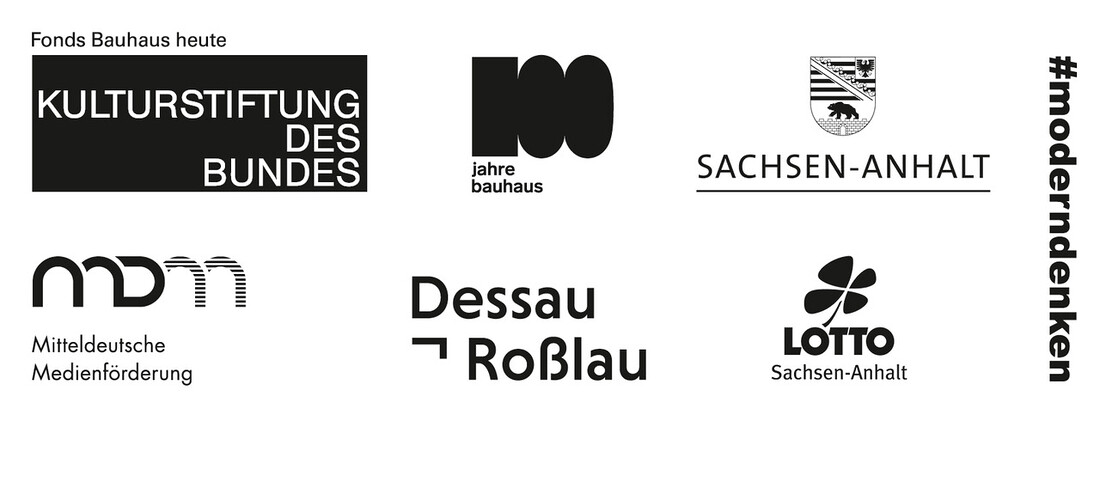Modell und Ruine [Model and Ruin]
May 25–June 10, 2019
The 2019 Werkleitz Festival Modell und Ruine [Model and Ruin] curated by Daniel Herrmann and Alexander Klose presents the works of 13 international artists as part of the Bauhaus Centenary celebration. Their projects are developed for the festival and play with the tension between the phenomena of models and ruins and their relevance in modern history. The works will be shown from May 25 to June 10 2019 in Dessau, Germany.
As powerful images, models—much like ruins—serve to construct history, explain the present and generate the future. The recurring rise and fall of Dessau seems somehow to draw such connections together like a burning glass. The exhibition parcours connects the classicistic Georgengarten with the classical modern architectural ensemble of the Meisterhäuser and the historicistic Mausoleum. The intention is to present Bauhaus in the larger context of the 250-year history of the modern age.
The featured artists are:
Haseeb Ahmed (US/BE), Rosa Barba (IT/DE), Aram Bartholl (DE), Michael Beutler (DE), Haris Epaminonda (CY/DE), Holmer Feldmann feat. Piotr Baran (DE), Angela Ferreira (MZ/PT), Nikolaus Gansterer (AT), Christoph Girardet (DE), Cornelius Grau (DE), Romain Löser (FR/DE), Andrea Pichl (DE) and Magdalena Rude (DE).
Accompanying the exhibition, the film installation and film program curated by Florian Wüst and presented both at the Mausoleum and at Kiez-Kino, Dessau, focuses on the city as a stage for profound societal upheaval. The settings of the historical and contemporary films range from Berlin, Dortmund and Magdeburg to Białystok, Skopje and Asbestos, Canada. Films shown by Harun Farocki, Ulrike Franke & Michael Loeken, Johannes Gierlinger, Detlef Gumm & Hans-Georg Ullrich, Juliane Henrich, Sasha Litvintseva & Graeme Arnfield und Adnan Softić.
Guided tours of the exhibition parcours and excursions to Wörlitzer Park, the city museum and the city archive of Dessau further examine the festival’s theme. The catalogue with an extensive selection of texts on models and ruins and on Dessau as a location of various forms and phases of modernity will be released at the start of the 2019 Werkleitz Festival.
Program
Festival opening
May 25, 7pm, Mausoleum Dessau, including a guided tour through the exhibition parcours with the artistic directors and a DJ Set by Super Flu in front of Georgium Castle.
Film screenings
May 29, 8pm, Kiez-Kino Dessau
Friede Freude Katzenjammer, Detlef Gumm, Hans-Georg Ullrich, DE 1991, 90 min
June 5, 8pm, Kiez-Kino Dessau
Göttliche Lage, Ulrike Franke, Michael Loeken, DE 2014, 104 min
Mockups in Close-up: Architectural Models in Film 1919–2019
June 9, 5pm, Mausoleum
Presentation of on-going film project by Gabu Heindl and Drehli Robnik
film lecture with Gabu Heindl
Opening hours exhibition parcours
Monday–Thursday: 2–6pm
Friday–Sunday, Whit Sunday: 10am–7pm
The Moholy-Nagy/Feininger House is open Friday–Sunday and Whit Monday from 10am to 7pm. The Moholy-Nagy part is also open Monday-Thursday from 10am to 6pm. The performative intervention by the artist Haris Epaminonda will take place at the Feininger House on Friday/Saturday/Sunday.
Further activities presented by Werkleitz for Bauhaus100
The exhibition and communications project Atlas – Im Spiralnebel der Moderne [Atlas – In the Spiral Galaxy of Modernity] is presented in conjunction with the Werkleitz Festival. The collaborative project features interactive apparatuses of perception. It examines the great number of image vehicles that in the historical progression of modernity—from the late 18th century through the present—emerged out of the space between the polar forces of models and ruins. It is shown in the Mausoleum in Dessau.
The audio-visual performance Manufactory by Transforma curated by Sandra Naumann is presented on June 8 on the historical Bauhaus stage. The performative live installation examines historical changes to the workplace. Taking the visual motion patterns of handwork practice as a point of departure, the performance traces the shift from physical labour to the routines of modern production lines. The soundtrack was created by the renowned musician Sascha Ring (Apparat).
All festival events are public and can be attended free of charge.
For further information and the detailed Festival program please click here or contact Cornelia Hänchen at presse [at] werkleitz.de.


